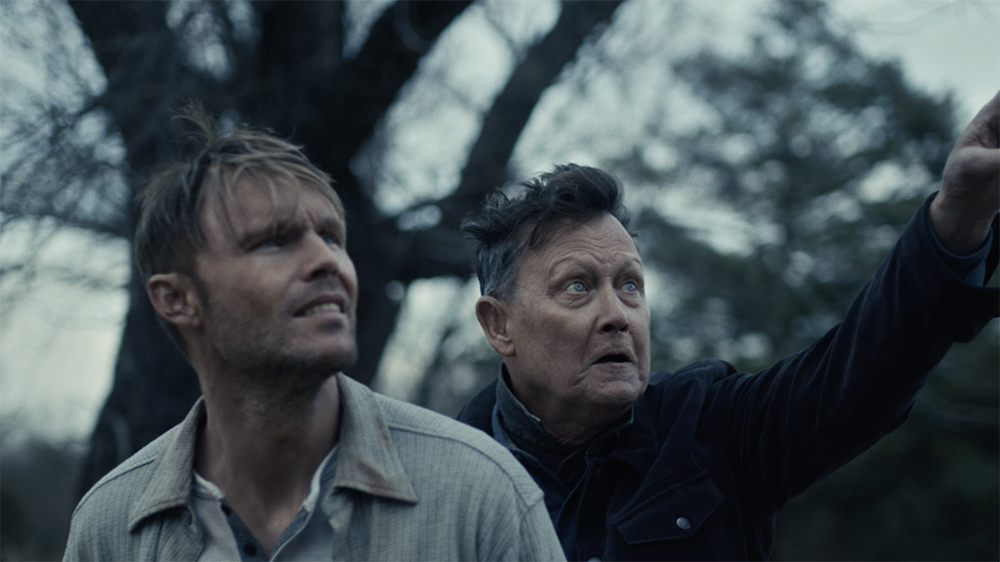
At a dilapidated farmhouse that is slowly decaying Josiah (Robert Patrick), the aging patriarch of the Graham family ekes out a defeated existence boozing his way through his remaining life while being looked after by his son Tommy (Scott Haze). Elsewhere, down on his luck former convict Eli (Nick Stahl) struggles between the sheriff who is still determined to find an excuse to throw him back in jail and the sordid criminal elements that he finds himself hopelessly in debt to. Still elsewhere, Mary (Kelli Garner) struggles with a shaky marriage and her own poor mental health.
These three seemingly unconnected tales are united by a central fact and one key event. The fact is that all our leads happen to be members of the Graham family. The event is a group of businessmen with interests in acquiring that dilapidated farmhouse and its land for oil drilling purposes. This sets off a chain of events, in the grand tradition of Southern Gothic tales, drawing everyone together for one hell of a family reunion forcing the family to face the many secrets clouded in the dark of their past.
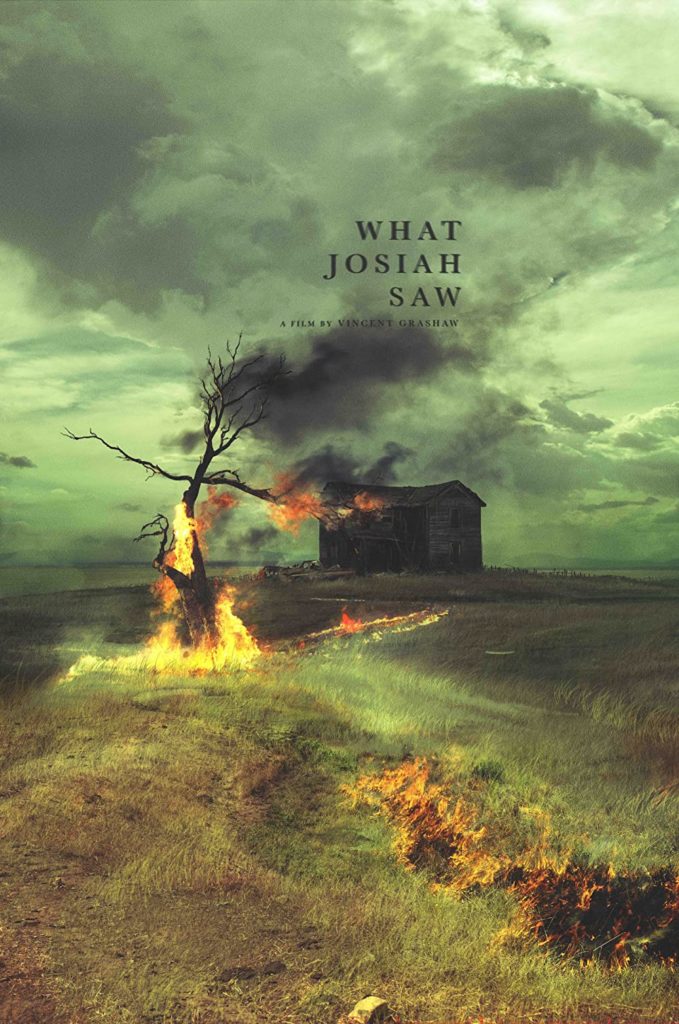
Written by Robert Alan Dilts, What Josiah Saw is the third feature by director Vincent Grashaw and marks his first endeavor into the realm of horror. His background with drama and thrillers certainly shows in this film’s construction as it manages to create a sufficiently haunting atmosphere while also delivering a very complex, very human story that is sure to pull at the heartstrings. Fans of the A24 model of horror film that has gained popularity in recent years will find a lot to love here. The movie takes its time to present our central family allowing them to be layered characters rather than disposable victims. From the first moments, everything in the film pulls towards creating a sense of uneasy mood and tone opening with gorgeous atmospheric shots of the countryside at dusk while an ominous and ethereal score plays. This sort of rural Southern Gothic aesthetic brings to mind a flair rarely seen outside of overlooked gems like 1990’s The Reflecting Skin.
What is particularly effective with What Josiah Saw’s execution is the way the story is told in a chaptered format. This in and of itself is nothing revolutionary, but across the chapters, each tale is able to subtly shift its tone and sometimes even genre to effective ends. The second chapter, particularly, is going to hit people differently depending on their own tastes. It strikes a mood much closer to the kind of quirky neo-noir thrillers popularized by David Lynch and could easily fit within the world of his movies as its own nonsensical cutaway that is interesting but never connects all the dots. Where this film differs is that everything gets mostly tied up by the end.
At the heart of this story is the Graham family and like any good gothic tale, there are some secrets behind the tortured state we find them in; which is artfully mirrored by the rundown condition of the farmhouse. Early in the first chapter “The Ghost of Willow Road” we get the story second-hand along with the businessmen as they begin drafting plans to make an offer for the family’s property. When their kids were still young, Miriam Graham didn’t show up one Sunday morning at church and was eventually found having hung herself from an old oak tree just outside their home. Since then the family fell apart leading many to call the area haunted or cursed.
The manner in which we get this information relayed is some subtle yet clever build-up. We are given the broad facts behind how the Graham family fell apart, but the specifics are locked with the family members which leads to a slow drip-feed revelation that is all the more complicated by conflicting narratives. The bulk of the first chapter focuses on the titular Josiah and the one son that stuck around Tommy. So as the title suggests, what did Josiah see exactly? His days of drinking his life away come to an abrupt stop after a frightening revelation of sorts. As he explains to Tommy, he met their mother and learned she is burning in hell for committing suicide and that it is the fate of the rest of them to burn as well. However, she has shown him a way that she can be redeemed while the rest of them can wash their sins away.
All of this is rather vague, in the best way that most rural church religious prophecy is, but in short Josiah concludes that if they set out to better themselves and then right a great wrong that was committed everyone can be redeemed. It is curious to watch Josiah’s demeanor change rapidly from a comically sad drunk to a coherent religious zealot. Robert Patrick gives an incredible scene-stealing performance as Josiah being able to turn from impassioned speaker to cruel and sinister monster on a dime. In the wrong hands, Josiah’s portrayal could likely ruin the film and kill any and all emotional impact. Thankfully, Patrick swings for the fences and it plays very effectively.
One might easily be misled to assume What Josiah Saw is a film focused on religious horror. These themes are pretty heavy in the first chapter, but that is not really the case. To me, the film has much more to do with one’s mentality and particularly the nature of abuse and how that can change a person. A bit like Rose Glass’ debut A24 flick Saint Maud, this is a movie that uses trappings of the darker impact religion can have on a person to frame a deeper discussion about mental health. This is best seen near the end of the chapter as Josiah’s growing fervor leads to what has to be one of the most incredibly awkward scenes in cinema for 2021. I won’t spoil it here because you deserve the full effect of being blindsided by it on first viewing. But without a doubt, it will force viewers to immediately question everything regarding Josiah’s prophecy and the plans he has set into motion.
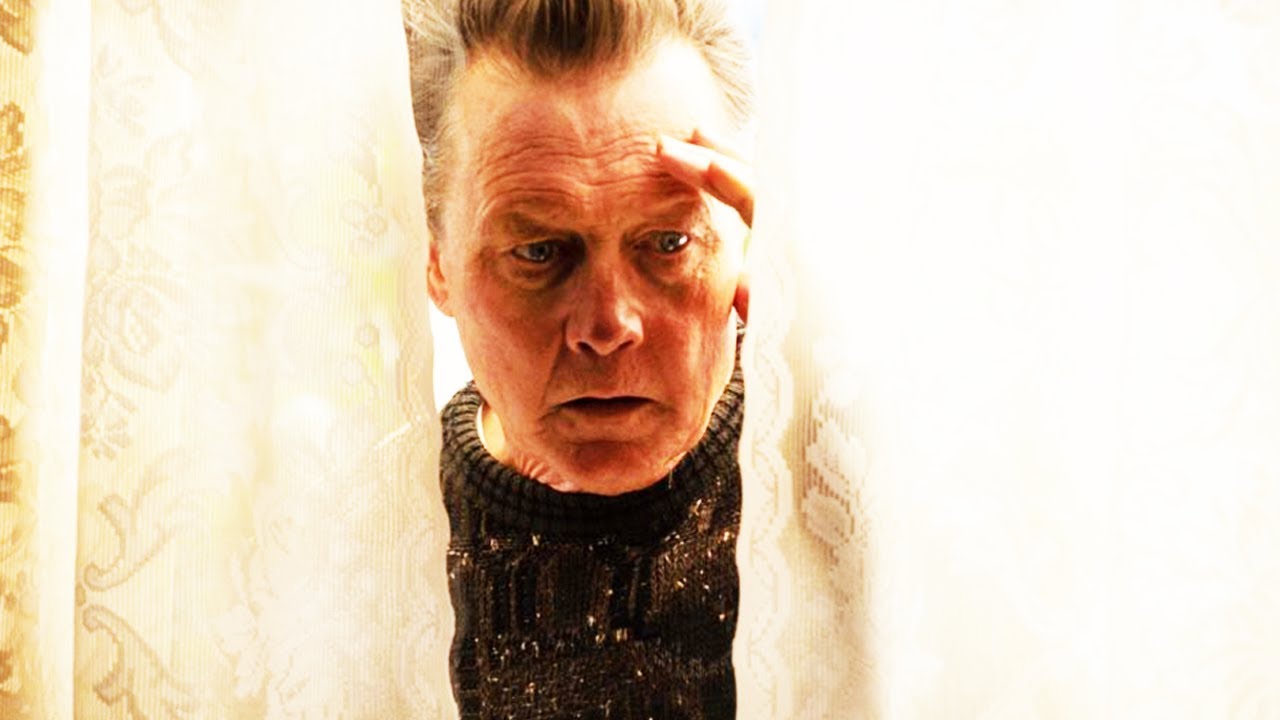
The second chapter “Eli and the Gypsies” marks the aforementioned drastic tonal shift. Gone are the haunting ethereal backing tracks. Gone is the decaying gothic farmhouse. Eli is a guy locked on the wrong side of the law and the little bit we learn about him at first makes him hard to root for. We discover early on after a visit from the local sheriff that a young girl has been abducted and Eli happens to be his prime suspect due to a prior conviction regarding sleeping with someone underage. Eli refutes the nature of the charge, but we are never given the whole story so it leaves viewers a bit uncertain about where we should stand with him. This is complicated all the more by Nick Stahl’s charismatic performance.
This second chapter is deliciously weird and plays much more like a rural American crime thriller than a horror film. Other than some carefully cut flashbacks and the revelation near the end of the chapter that Eli is one of the wayward kids of the Graham family the chapter almost plays out as its own contained narrative. This may frustrate some for feeling too far afield compared to what has been set up before, but I fell in love and got lost in the very unique tone it managed to create. Eli is in deep debt to a local criminal organization and eventually rolls up at a bar that feels like it could be at home alongside Twin Peaks’ roadhouse to meet with Boone (Jake Weber). In the time-honored tradition of crime flicks, Boone offers Eli one last job to clear his debt and get his records scrubbed so he can head off and start a new life.
That job leads to a mire of strange topics regarding World War II, stolen gold, and the Romani people. It may come off as a little insensitive to some, but considering the brash criminal elements at play, it felt more like a reflection on the villainous world Eli has gotten himself wedged into. But in the end the job is simple, go infiltrate a party and keep the guests occupied while his partners will steal a cache of gold. Like any good crime film, nothing goes right, but before everything goes to hell we get a bit of the horror brought back center stage. Eli spends some of his time at the party having his fortune told by a medium that hints both at the underlying secrets behind the film and the fate that awaits Eli later in the story.
All in all, I found this to be my favorite segment of the film. Quirky crime films might be a dime a dozen, but there is something about the tone and pacing here that just works so effectively. Eli is a complex character in that you readily want to root for him, but his dark past makes you question how altruistic some of his actions might be. It would probably function just as effectively sliced out on its own as some sort of odd short film that hints at something greater without explaining what that is. Other than some clues during Eli’s time with the medium, we don’t get much major connective tissue until the final moments of the chapter when he receives a letter from the drilling company about their offer for the property at Willow Road.
The third chapter “Mary May I” feels a bit more disjointed, unfortunately. Mary’s story is equally interesting as she struggles with a strained marriage to her husband Ross (Tony Hale) and their attempt to adopt a child. She seems to be suffering from some sort of mental trauma and the adoption process is halted a bit by the need for Mary to be deemed mentally fit to proceed. It is heartbreaking to hear her plead the case during the evaluation. Initially, the chapter seems like it is going to be some sort of deep character study but the majority of this section bleeds into the final climax as all the varied characters unite at the farmhouse over the offer to buy the farm.
While we do get the full revelation of Mary’s backstory during that segment it does feel like a bit of what could have been her own individual story gets robbed of its time to develop. I found her, in the initial part of the chapter, to be an interesting character and for all her flaws there is something intimately relatable seeing her blow up at someone making small talk at a dinner party for popping off with random platitudes like “I’m sure you’ll be wonderful parents” despite only meeting them for the first time. Maybe it is just me, but I feel like we can all relate to that sort of disdain for meaningless small talk in awkward situations.
It is a hard criticism to make if I am being honest. Clocking in right around two hours, I am not sure if it is fair to say I wished the film had been just a little longer with the final farmhouse confrontation in its own more defined section to give Mary’s initial story more room to breathe. I may very well be in the minority on that front, but it is a testament to how engrossed I was in the movie that I found myself shouting “no please, tell me more!” when I noticed the runtime was almost over. When the worst criticism that can be mustered is simply “I want more” that says a lot to me about just how satisfying an experience the film is.
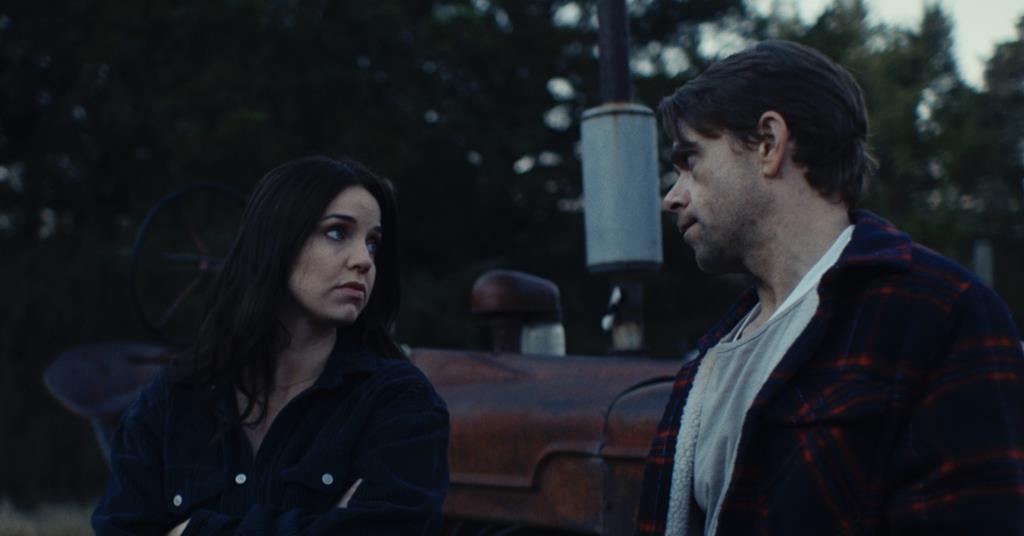
Eventually, Eli links up with Mary over the company’s purchase offer and together they return to the farmhouse at Willow Road to confront Tommy and Josiah in the hopes to sell the farm, move on and get a new lease on their lives. The confrontation leads to the ultimate revelation of what tore the family apart and drove Miriam to commit suicide. The ending deserves to be seen and there is a terribly impactful twist that is worth being blindsided by for the full weight of its effectiveness to be felt. It gets into some pretty heavy themes regarding the nature of abuse and how its impact can carry across generations through a family with disastrous results. The unfortunate lives we see Tommy, Eli, and Mary shouldered with seem to be directly linked to the childhood trauma they have all experienced. It all explodes into a stunning visceral conclusion that is sure to leave your jaw wide open in shock.
Most important, however, is that in the end we have conflicting stories regarding the specific inciting events and the film is careful to never tell us the whole truth. We never get a firsthand look at what really happened. We have Eli and Mary’s account weighed against Tommy and Josiah’s. Viewers are left to decide which deeply flawed character they wish to believe. More sinister still is a final stinger just before the credits offering some information that is as equally disturbing as it is a carefully placed scene to balance the scales just in case you thought you had concluded what the truth was.
This sort of layered nuanced storytelling is exactly the reason What Josiah Saw is an incredibly enjoyable and well-executed horror film. While it may present the trappings of more traditional horror elements, these are much more a vehicle to tell a complex story of abuse and psychological trauma. For all its gothic flair and ghostly visions, there is a very real horror here that may hit a little too close to home for some. Its well-composed characters and their overwhelmingly dark secrets will likely hang with viewers for some time as they ponder this series of tragic events and the literal inferno of madness that it concludes with.
What Josiah Saw was screened as part of the 2021 Fantasia Film Festival. The festival runs virtually from Aug. 5 – 25, 2021.
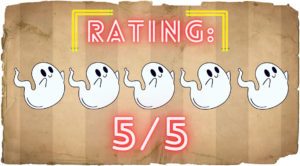
More from Fantasia Film Festival:
The Killing Cell falls into familiar tropes and beats of the found-footage genre. Notably, the plot sees a group of friends/paranormal investigators head to an abandoned facility, only to find…
Buffet Libre marks the third feature film from actor/director Zoe Berriatúa, and his first dive into more macabre subject matter. Here, the story follows an older Chinese couple, Xian (Yan…
We meet Elena, a “gajin” with a British father and Japanese mother, at her lowest, in a hospital bed after an implied attempt at taking her own life, or self-harm…
Sorority Babes in the Slimeball Bowl-O-Rama (also known as The Imp in the UK) is a 1988 American B-movie horror comedy written by Sergi Hasenecz, directed by David DeCoteau, and…
After stepping away from filmmaking since 2019’s charming musical comedy Dance with Me, director Shinobu Yaguchi makes his return with Dollhouse (2025), a horror tale centered on a cursed doll,…
THE CHILLING FOUND FOOTAGE HORROR FROM CHRIS STUCKMANN AVAILABLE ON DVD, BLU-RAY & DIGITAL FROM 15TH DECEMBER In Shelby Oaks a woman’s desperate search for her long-lost sister falls into…
*I feel the need to add to this article the fact that I was engaged as a freelance contributor to the film’s post-production team, specifically responsible for creating the end…
Why are horror and exploitation films so popular? Why do fans willingly submit themselves to the gruelling, torturous experiences that these genres provide? The simple answer is it feels good…
Nicolas Cage, FKA twigs & Noah Jupe deliver us from evil in ‘Jesus horror’ Altitude will release biblical horror The Carpenter’s Son in UK and Irish cinemas on 21st November. A…
Some horror games want to scare you. Look Outside wants to crawl under your skin, settle in, and remind you of just how fragile you are — and it succeeds…
Dustin is a potentially overqualified office worker who has a lifelong love and fascination with Japan and all things Horror. With a bachelor’s in English Literature and a master’s in Library Science, he devotes way too much time to researching and thinking critically about the media he enjoys. When not celebrating trashy horror films, anime, and idol music, he can be found raving about all things genre cinema as a co-host on Genre Exposure: A Film Podcast or indulging a passion for storytelling through tabletop roleplaying games.